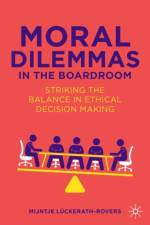av Mijntje Luckerath-Rovers
377
In the boardroom, executive and non-executive directors must frequently make decisions balancing competing interests and conflicting moral norms, with their actions impacting employees, customers, shareholders, and society at large. These decisions are not always understood, frequently criticised, and sometimes deemed immoral or unethical.Disbelief over the apparent mismatch between the actions of the company and the moral norms of wider society can damage the corporate reputation and lead to embarrassing U-turns. However, despite the importance of these decisions and the interest they generate, we rarely ask how these decisions are made? What role do moral norms and moral identity have in the boardroom? And how do companies sometimes interpret the moral norm so spectacularly poorly? The picture revealed is of a decision-making process that is neither simple nor morally black-and-white.This eye-opening book examines the role of moral judgement in the boardroom and how the actions and behaviours of directors in tackling moral dilemmas can lead to wildly different outcomes and consequences. It includes forensic breakdowns of recent, high profile boardroom decisions, with alternative outcomes explored and assessed. The detailed descriptions of the case studies include the moral dilemmas and the subsequent decisions of the directors of Adidas, Bud Light, Ajax, Yahoo!, G-Star, and many others. This book provides practical guidance for corporate decision-makers looking to assign the right weight to conflicting moral norms and interests, as well as all those seeking to gain more insight into the workings of the boardroom.Mijntje Lückerath-Rovers is Professor in Corporate Governance at TIAS Business School, Tilburg University, the Netherlands. She holds a PhD in financial economics and is also a labour and organisational psychologist. Before starting in academia, she worked in finance and continues to hold numerous board positions in large corporates, as well as non-profits. She has previously held positions at Erasmus University and Nyenrode University. Her research focuses on the role of the board of directors, board diversity, corporate governance and long-term value creation.

